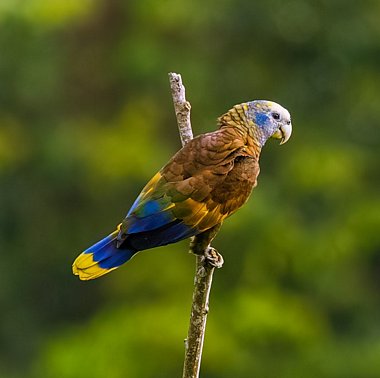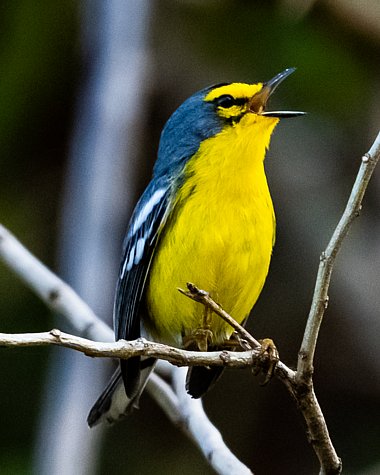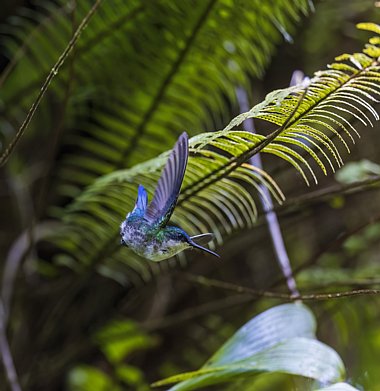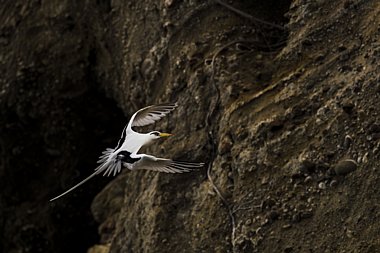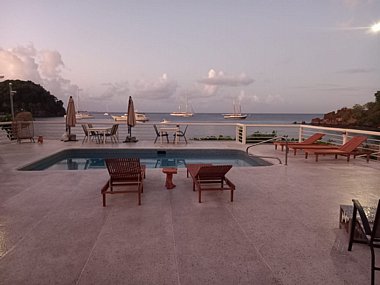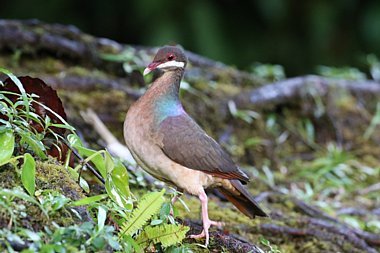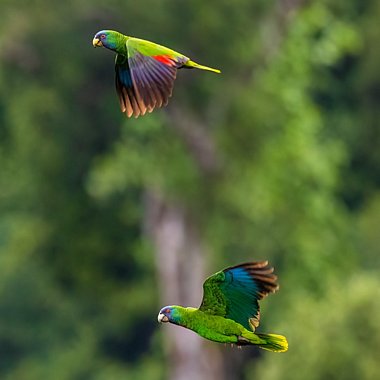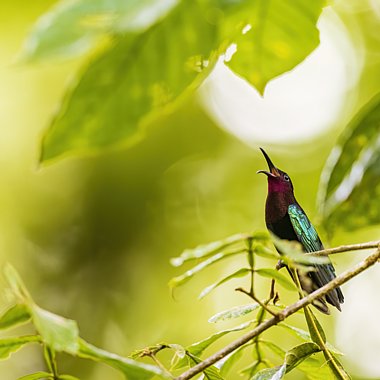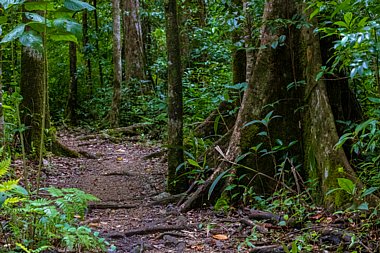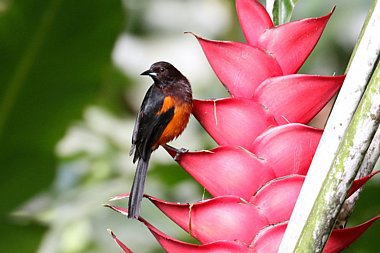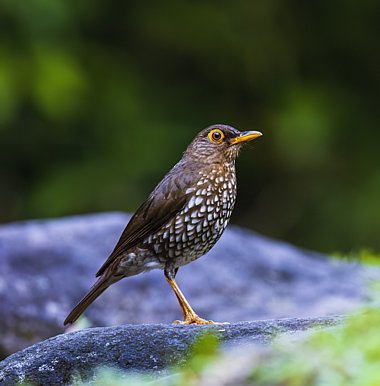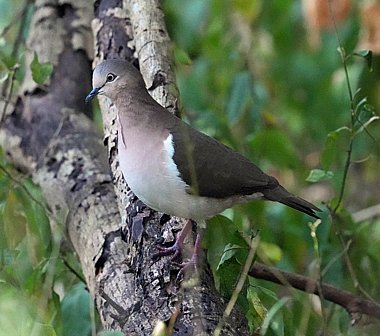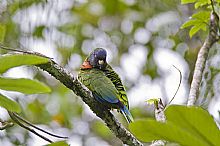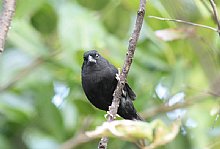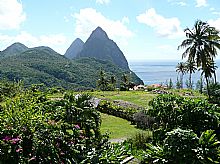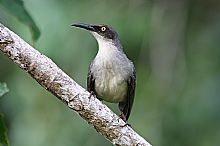NEW! Lesser Antilles - A Caribbean Island Hopping Adventure
A six Caribbean island tour, each boasting their own endemics and superb tropical birding.
| Destination | |
|---|---|
| Focus | |
| 2026 Dates | |
| Duration | 15 Days |
| Guides | |
| 2026 Price | £7495 pp £695 single supplement. Deposit £1400. Ryan will be joined by one from the Heatherlea Team. pre-flight airport hotel and lounge are inc. |
| Max Group Size | 7 per guide |
- Free Bird Guide
FREE copy of Birds of the West Indies with every room booked on this holiday.
- Tour Info Pack
- Enquire
Tucked away in the south-eastern corner of the glistening Caribbean Sea, the Lesser Antilles are an island chain running in a long sweeping double arc. On this holiday of a lifetime, we visit six of these islands – St Lucia, St Vincent, Martinique, Dominica, Guadeloupe and Grenada in search of key, single island and Lesser Antillean endemics, many of which are also critically endangered. Arguably, one of the most coveted destinations on the planet, the region is famed for its spectacular beaches, turquoise seas and the year-round sunshine and we make sure there will be ample time to relax during our time in this tropical paradise.
While the relaxing, Caribbean remains throughout, we notice differences between the heavily forested volcanic islands of St. Vincent, Dominica, St. Lucia and Grenada and the culturally distinct French Overseas Territories of Guadeloupe and Martinique. Changing islands frequently, new and exciting birdlife is likely to be encountered each day and among these are four endemic species of Amazona, or Parrot. Impressive by both their very nature and rarity value, St Lucia, St Vincent, Red-headed and the jewel in the crown, Imperial Parrot will all be searched for on this tour. With endemics possible on all the islands we visit, there are too many other key targets to list in a single sentence… But, among those we hope to encounter are Grenada Dove, Guadeloupe Woodpecker, St. Lucia and Whistling Warbler, Blue-headed Hummingbird, Rufous-throated Solitaire, Lesser Antillean Saltator, Lesser Antillean Flycatcher St Lucia and Martinique Oriole, St Vincent Tanager, Lesser Antillean Bullfinch.
A private whale watching cruise to look for Dominica’s resident population of Sperm Whale, other cetaceans and seabirds will be another highlight. We stay in locally owned and operated lodgings, many of which offer sea views or are directly on the beach. Caribbean food is also a delight, each island offering unique and tasty dishes, all freshly made. A multi-island birding adventure like no other, join us as we discover the remarkably distinct and biodiverse island gems of the Lesser Antilles.
Enjoy your complimentary pre-flight overnight hotel before your holiday begins. Full details from our office! Read more about our Pre-flight Service here!
Day 1: Mon 5 January 2026 - Travel to St Lucia
After relaxing in our VIP Airport Lounge, we fly from from London to Saint Lucia. Upon arrival, we meet our local guide and transfer to our accommodation on a historic 60-acre estate, boasting elegantly decorated cottages. Nestled in a secluded natural history site with its own private beach, we may have time for a stroll around the grounds for our first birds, though after a day travelling, a relaxing swim in the placid Caribbean Sea may be just as appealing! We stay for three nights at the Balenbouche Estate, St Lucia.
Day 2: Tue 6 January – Des Cartiers Rainforest, St Lucia
Steeped in history, the preserved 18th Century plantation house and its lush tropical gardens are the perfect place to begin birding. Stroll around the grounds, we look (and listen out for) Lesser Antillean Saltator, Antillean Crested Hummingbird, Tropical Mockingbird and St.Lucia Wren. Heading out to Des Cartiers Rainforest, we spend the rest of the morning exploring the vast primary forest dominated by towering trees, gargantuan Tree Ferns, tiny bromeliads and orchids, many of which are indigenous to the region. On well established trails, St Lucia Parrot, St. Lucia Oriole, St. Lucia Black Finch Lesser Antillean Euphonia, Green-throated Carib, Grey Trembler and Scaly-breasted Thrasher are among the early possibilities. Changing habitats to a wetland site in the afternoon, our bird list increases with Blue-winged Teal, American Wigeon, Lesser Scaup, Ring-necked Duck, American Coot (Caribaea morph), Snowy Egret, Tricoloured and Little Blue Heron, Stilt, Spotted and Solitary Sandpiper, Willet, Greater and Lesser Yellowlegs and Belted Kingfisher likely to feature. In the mangroves, St Lucia Warbler is a key endemic we may see here, as is the endemic subspecies of Yellow (Golden) Warbler. An enthralling first day of Caribbean birding!
Day 3: Wed 7 January - St. Lucia and transfer to St. Vincent
The Dry Atlantic Forest is one of the most increasingly threatened habitats, much has been mercilessly cleared for development, but the small pockets remaining are important to an array of birdlife not seen in other regions! Recently split St Lucia Thrasher is our primary target, while other species at home in the dry forests include Caribbean Elaenia, Common Ground Dove and Carib Grackle. We watch for Red-billed Tropicbird at a nesting colony, before driving west to the quaint seaside town of Soufriere where Laughing Gull, Magnificent Frigatebird, Brown and perhaps even Red-footed Booby may be encountered with little or no effort. Nestled below the volcanic, towering peaks of Gros Piton and Petit Piton we take lunch in the attractive town, Lesser Antillean and Short-tailed Swift wheeling in the air around us. In the gardens, we hope to find spectacular Purple-throated Carib, before our time on St Lucia comes to an end and we transfer to the airport for an evening flight to St Vincent.
Day 4: Thurs 8 January – St Vincent’s special birdlife
In the heart of the densely forested North of the island, we have the special privilege of a pre-dawn visit to a site for rare St Vincent Parrot – one of the most spectacularly coloured parrots in the world! A species long on the verge of extinction and one rarely seen by tour groups, we have an opportunity to watch large flocks departing their overnight roost and filling the skies. Among St Vincent’s many avian treasures, we search for (near-endemic) Grenada Flycatcher, (soon-to-be-split) Lesser Antillean (St. Vincent) Tanager, Lesser Antillean Bullfinch and (the all-black morph of) Bananaquit. Later we meet the private landowner responsible for preserving this treasured forest, taking a short tour of a sustainable farm tucked away on the slopes of the surrounding hillsides. After the early start, we return to our beachside hotel early afternoon with the chance to relax on the balcony or by the pool, take a soak in the Caribbean Sea or merely take a siesta in preparation for the next day’s birding.
Day 5: Fri 9 January - St Vincent and transfer to Martinique
Travelling into the lush central highlands of the island, we explore some of the better-known sites for critically endangered and little-known endemic - Whistling Warbler. An intriguing member of the monotypic genus Catharopeza, it is the rarest warbler in the region and patience will likely be needed for a sighting. In these dense moist forests, we also look for Mangrove Cuckoo, Brown Trembler, Yellow-bellied Elaenia and St. Vincent Wren and as the air temperature warms up, Common Black Hawk and the endemic subspecies of Broad-winged Hawk. Throughout lunch and the afternoon watching from our beachfront hotel, birding prospects include Brown Booby, Magnificent Frigatebird, Royal Tern and others before we take a short, evening flight to the French island of Martinique.
Day 6: Sat 10 January – Martinique
Upon arrival into the bustling economic hub of Fort-de-France we board our vans and head north to prime birdwatching sites. The dry, scrubby forests here are White-breasted Thrasher territory, and though we already targeted it in Saint Lucia, it is crucial that we focus on the recently split Martinique Thrasher! Sharing these habitats are Zenaida Dove, Shiny Cowbird, Black-whiskered Vireo and the endemic subspecies of Yellow (Golden) Warbler. Aside from great birding, we scan the crystal-clear waters for Green Turtle, Gar and Spotted Eagle Ray. Before leaving the dry forest, we may encounter roosting White-tailed Nightjar.
Day 7: Sun 11 January - Martinique and boat transfer to Dominica
Martinique is a delightful island, and even during breakfast on the outdoor balcony we could enjoy Orange-winged Parrot and Rose-ringed Parakeet on their dawn flypast. Later we head to the Carbet range, birding within some of oldest mountains and forests in the entire Lesser Antillean region. Martinique Oriole is a key endemic we search for here, and once found we can focus our attentions on Lesser Antillean Euphonia - a recently identified regional speciality. Other desirable species include Gray Trembler, Rufous-throated Solitaire and Blue-headed Hummingbird – the latter known only here and in neighbouring Dominica. And after a morning in the forests, that is where we will be heading next, boarding our boat to get there through marine rich waters where we can hope to see dolphins, turtles, flying fish and perhaps the occasional seabird. Coming into port in Dominica, we transfer to our accommodation overlooking the breathtakingly beautiful Salisbury Bay where we stay for four nights.
Day 8: Mon 12 January – Northern Forest Reserve, Dominica
The island of Dominica is home to an array of sort after birds. and as such we spend more time birding here than anywhere else within the Lesser Antillean chain. Dedicating our first day to the Northern Forest Reserve, endemic specialities include Red-necked Parrot and Kalinago Wren, with Lesser Antillean Saltator, Lesser Antillean Flycatcher, Grey Kingbird, and Plumbeous Warbler also possible. With over 50 species of butterflies recorded, the reserve is also renowned for regional endemics such as Dominican and Godman’s Hairstreak, Godman's Leaf and St. Lucia Mestra. In the company of a knowledgeable and experienced forestry officer, we will also be introduced to the many fascinating and wondrous species of flora that inhabit this lush forest, enhancing our enjoyment of this important site.
Day 9: Tue 13 January – Imperial Parrot and Dominican, forest specialities
Making an early start, we leave our accommodation before dawn for the best opportunity to see one of the planet’s largest and rarest parrot species - the majestic Imperial Parrot (or Amazon). Critically endangered and with an entire population thought to be as low as 80 individuals, this iconic species is without doubt the days primary target, and we begin by surveying the towering tree canopy from a series of more open viewpoints. As we search for the Imperial, we have another chance for Blue-headed Hummingbird, alongside Purple-throated Carib, Lesser Antillean Bullfinch, Dominica House Wren and other regional specialities such as an endemic subspecies of Forest Thrush. Breaking for lunch at a favoured local haunt, once fed and watered we have options to continue searching for desired species (the Imperial Parrot being a significant one!) or return to the hotel for some rest and relaxation.
Day 10: Wed 14 January - Dominica Island boat trip
Taking to the seas, a boat trip into Dominica’s marine rich waters we have excellent chances to see some of the cetaceans and seabirds found there. Humpback, Short-finned Pilot and False Killer Whale are all possible, though our primary target this morning will be magnificent Sperm Whale. Dominica is one of only two countries in the world whose waters are home to mothers and calves year-round, and with an experienced captain at the helm we have every chance of as memorable encounter. Fraser’s, Spotted and Spinner Dolphin may also be encountered, and we watch out for ocean wanderers such as Cory’s, Great and Manx Shearwater, Leach’s and Wilson’s Storm Petrel. Following a relaxed lunch back at the hotel, we visit a reliable nearby site for Lesser Antillean Pewee, Red-legged Thrush, Smooth-billed Ani, Grey Kingbird and Tropical Mockingbird among others. An endemic subspecies of Barn Owl (likely to be elevated to full endemic species status) will also be looked for, before our time in Dominica expires.
Day 11: Thurs 15 January – Transfer to Guadeloupe
Options for our final morning in Dominica include a relaxing wander along the beach, to some final birding around a local riverbank which has produced Ringed and Belted Kingfisher and American Kestrel (of the subspecies caribaerum) in the past. In the afternoon we board our vessel to the ‘Butterfly Island’, aka the stunning French overseas territory of Guadeloupe, heading to our accommodation soon after our arrival. Birding at a nearby wetland, likely species include Great, Snowy and Cattle Egret, Little Blue and Green Heron, Sora as well as an array of overwintering North American shorebirds including Short-billed Dowitcher, White-rumped Sandpiper, Semipalmated and Wilson’s Plover. The island is also a good place to search for North American Wood-warblers, with Northern Waterthrush, Blue-winged, Blackpoll, Prairie and Cape May Warbler among those recently recorded. We stay overnight on the island of Guadeloupe.
Day 12: Fri 16 January - Explore Guadeloupe and travel to Grenada
The Basse-Terre region of Guadeloupe is remarkable, its forests offering opportunities to see some of the more secretive species rarely which are harder on other islands. Our guides know some good birding sites for Guadeloupe Woodpecker, the last surviving endemic after the extinction of both the Parrot and Parakeet! Other possible birds include Brown Trembler, Bridled Quail-Dove, Forest Thrush, Scaly-breasted and Pearly-eyed Thrasher. A mid-afternoon departure to Grenada follows, the sixth, and last ‘new’ island on our Lesser Antillean adventure.
Day 13: Sat 17 January – Birding Grenada and return to St. Lucia
With a surviving population as low as just 30 individuals, the Grenada Dove is a species on the brink of extinction. An important but very difficult target, we draw on our local guide’s experience and knowledge amassed over numerous previous trips, to search for this delicate, unassuming species in what is left of its natural habitat. We also look for Grenada Wren, Spectacled Thrush, and the local race of Hook-billed Kite (a possible future split) in Southern Grenada before venturing north, where habitats are dominated by towering mountains and windswept slopes. Here, we focus our attention on two hummingbird species - the endemic subspecies of Green-throated Carib and Rufous-breasted Hermit. Also of interest are Lesser Antillean Thrush (known in some circles as a subspecies of Cocoa Thrush), the stunning Grenada (Lesser Antillean) Tanager plus Yellow-bellied Seedeater, Black-faced Grassquit, Eared and Common Ground Dove. Our afternoon departure for St. Lucia ensures we arrive in time to enjoy another swim at our private beach, before winding down the evening with a celebratory cocktail or two on our final evening together. Overnight St Lucia.
Day 14: Sun 18 January – Return to the UK
Following breakfast and an opportunity for a final swim in the sea, we transfer to the airport for our homeward journey, arriving in the UK on Mon 19 January (day 15).
Please note: all itineraries are given as a guide only. Actual holiday content may vary according to the judgement of your guide, and elements beyond our control (eg weather).
What's included in your holiday price:
- scheduled outbound and return flights to St Lucia from a London airport. All Internal flights and ferry journeys between the islands, airport taxes, transfers harbour fees.
- all accommodation and meals, including breakfast, lunch and dinner. Some mealtimes will be eaten 'in the field'
- ground transportation as outlined.
- any reserve and park access fees.
- Whale watching boat trip off of the Dominica coast.
- the services of your leaders.
- The Heatherlea Pre-Flight Service offers everything you need at the airport, including hotels, car parking, airport lounges, regional flights, and upgrades. Let Heatherlea take the strain! Pre-flight airport hotel and lounge included subject to terms and conditions. Read more..
Free Field Guide! - Birds of the West Indies by Allan Keith et al (published by Helm 2020) is included in your holiday price. One copy per room booked.
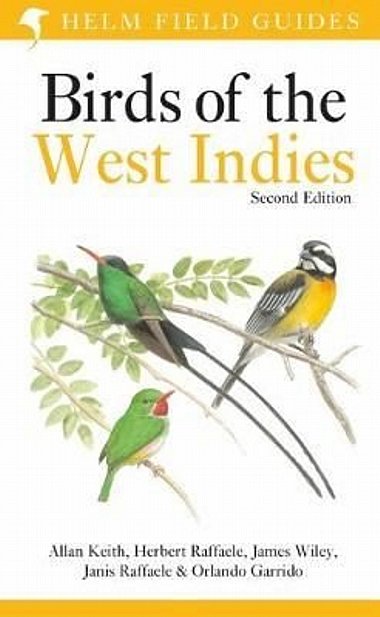
What's not included in your holiday price:
- personal insurance, drinks and other personal expenses, visa costs where necessary, optional tips to local guides/other staff, and any other costs not specified as 'included'.
More holiday information:
Accommodation is in hotels or lodges with all rooms en suite. Some of the lodges are remote, and have simple-style rooms. All are spacious, have en-suite facilities, and are very comfortable to a good standard.
Food You can expect fresh local produce including meat, poultry and fish full of Caribbean flavour! Fresh local fruit and vegetables are usually available and very tasty too. Picnic lunches will be provided where necessary. Water is included, and we suggest bringing your own water bottle to be topped up. Meals vary from one island another, and during our tour we hope to try many of the specialities. Vegetarian and other diets are welcome.
Walking is generally light/moderate, though there are some trails where a level of exertion is required. You will need an average level of fitness for this holiday.
Weather will be mixed. Mostly the temperature will be warm, with the possibility of rain. In some locations the weather is hot and humid, in others hot and dry, and at altitude can be cool and wet.
Insects There are biting insects, though not usually as a major problem. You should bring insect repellent.
Group size is restricted to 12 clients maximum.
Flights are by scheduled airline, from a London airport. We may be able to offer flight arrangements from another airport and/or or quote without flights so you can make your own arrangements. If you wish to add an extension either before or after your holiday, please contact us and we will be happy to arrange this for you.
Other birding and wildlife holidays in Central America & Caribbean
- Costa Rica Classic Tour
- Costa Rica Classic Tour - PLUS!
- Costa Rica with Easy Walking
- NEW! Belize - Wildlife of the Yucatan Peninsula
- NEW! Costa Rica: Birding, Whales and wildlife during migration
- NEW! Cuba including Havana
- NEW! Jamaica, Dominican Republic and Puerto Rico
- NEW! Mexico - Oaxaca
- NEW! Panama
- NEW! Tranquil Trinidad
- Trinidad, Tobago and Saint Lucia
Why choose Heatherlea for your birding and wildlife holiday in the Americas?
Our overseas holidays are planned with care to offer great birding and wildlife, led by capable Leaders who really look after you. Every holiday is run the 'Heatherlea Way', and we hope our Overseas Adventures remind you of the quality and care so many of you enjoy in Scotland. That means rewarding and exciting days in the field, and good quality accommodation and meals, with a real flavour of the country we are visiting. Heatherlea always seek to include the personal touches that make all the difference.
Heatherlea holidays are not ‘dawn to dusk’ expeditions. Our less-intensive approach is ideal for those who want to relax whilst experiencing the best wildlife watching, and wherever possible we organise early or late activity on an optional basis. We also take sensible breaks when in very hot places and regular comfort breaks on every holiday whenever possible. All itineraries are planned carefully around the best wildlife opportunities, and you won’t miss out on memorable wildlife, whilst enjoying relaxed, informal days that are great fun.
The really important part of any wildlife holiday is the experience for you, our valued customer. Heatherlea invest in many things to offer you the best possible service;
- We have been organising birding and wildlife holidays for over 30 seasons, and have a highly experienced and capable office team. We also offer a telephone and email service outside normal office hours.
- Heatherlea overseas holidays have a maximum of 12 clients per trip, putting the emphasis on personal service, and helping you get the best possible experience.
- Our holidays often include things which others might invite you to pay yourself, for instance Departure Taxes and tips to hotels.
- All elements of our holidays are sold under our own licence, ATOL 6113. Under ‘Flight-Plus’ legislation it is a legal requirement of any tour operator to hold an ATOL licence for the supply of any overseas holiday where a flight is involved, if that holiday includes either overseas accommodation and/or car hire. It can be a criminal offence for an operator to book flights as part of a package without an ATOL licence. Heatherlea also hold full Tour Operator Insurance for your added protection.
- Heatherlea is your complete wildlife holiday provider. Our ‘Back Office’ team can organise all your pre-flight and other travel needs. Our specialists will help you book the right services, at the best price. Book holiday extensions through us, and your ATOL protection is extended further. We don’t charge extra for this service.
- Heatherlea is a limited company, registered in Scotland, and registered to pay VAT (applies to all holidays within the European Union).
Trip Reports
Coming Soon
- Free Bird Guide
FREE copy of Birds of the West Indies with every room booked on this holiday.
- Tour Info Pack
- Enquire

